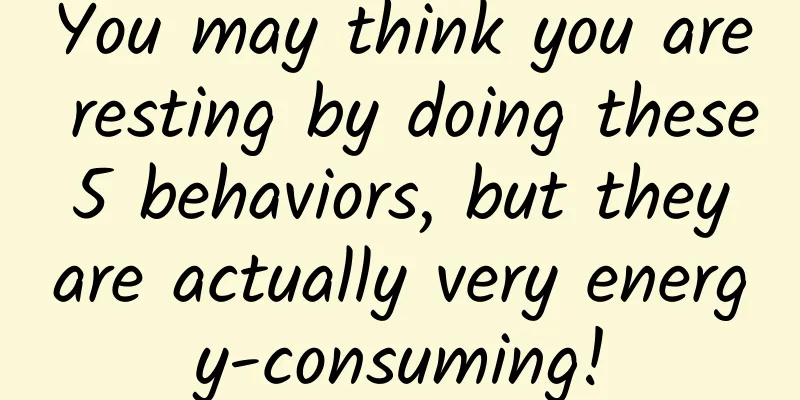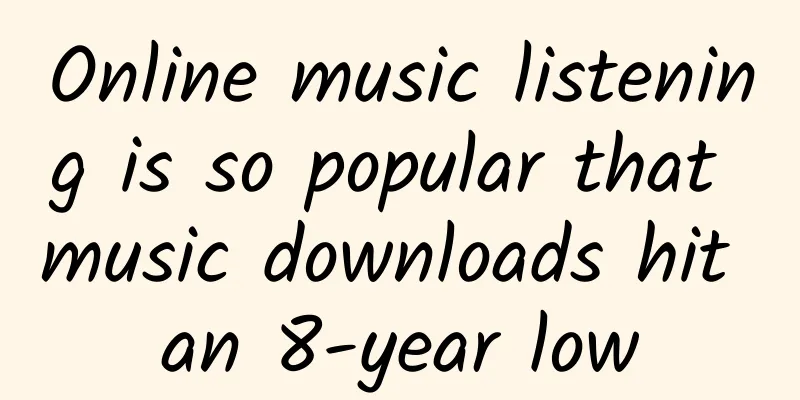You may think you are resting by doing these 5 behaviors, but they are actually very energy-consuming!

|
After you finish your work and walk out of the office building exhausted, what can you do to rest and catch your breath? Have a big meal? Watch a movie? Use your phone? Sleep in? Play games all night? There are many behaviors that appear to be rest and relaxation on the surface, but in fact they consume energy, damage the body, and corrupt the mood, causing long-term harm to our physical and mental health. Today, let’s talk about these 5 common behaviors that are thought to be resting but are actually very energy-consuming. Copyright images in the gallery. Reprinting and using them may lead to copyright disputes. 1. Excessive sleep: the more you sleep, the more sleepy you feel As we all know, sleep is very important. Sleep is like charging our bodies. It not only allows us to restore our physical strength, but also allows us to consolidate our memory and repair our psychology. On the contrary, lack of sleep is like an uncharged battery, which will make us miss the opportunity to repair our body and mind, causing us to feel tired, lack of energy, and upset. Over time, it will damage our health and do more harm than good. However, what many people don’t know is that excessive sleep can also cause problems . It is like the battery is fully charged but is still being charged continuously, which may lead to overheating or even explosion. Lack of sleep or excessive sleep is one of the most important and typical diagnostic criteria for depressive disorders. A large-scale British survey found that long-term excessive sleep is associated with lower intelligence levels, diabetes, heart disease, Alzheimer's disease, depression, infertility and other diseases. After a hard week of work, many people choose to sleep in on the weekends. However, after waking up, they do not feel energetic, but groggy, headache and fatigue, which are very similar to the symptoms of a hangover. Scientists call it " sleep drunkenness". People become more tired after oversleeping because unhealthy sleep rhythms disrupt the biological clock in the brain that controls the body's daily cycles. For example, your daily biological clock is to get up at 6 o'clock, go out at 7 o'clock, have breakfast at 8 o'clock, and sit in the office typing on the computer at 9 o'clock. On weekends, although you are lying in bed, your biological clock will still wake up every cell in your body at 6 o'clock, so that the cells can take their places and perform their duties. In other words, you may seem to be "sleeping in", but you are actually "idling" . Tires that spin in place are more damaged, and by the same token, lying in bed and "idling" will naturally cause a lot of wear and tear. 2. Browsing your phone: The more you browse, the more anxious you become. In the eyes of most people, surfing the Internet and browsing on their phones are the "best short-acting over-the-counter analgesics." Especially short videos, most of which are simple, straightforward and brain-free, with bright tunes and dynamic rhythms, as well as short, frequent flash screens and information bombardment, which bring continuous, high-intensity visual and auditory stimulation, triggering the brain to secrete a large amount of dopamine, making people immersed in the happy experience of watching more and more, and temporarily putting aside all worries. Therefore, many people, when they wake up in the morning, the first thing they do is pick up their phones, refresh their Moments to see if their friends and family have updated their status, then open the official account to see if they have missed any major news, and then get up and wash up; before going to bed at night, they have to repeat the same process. Even during fragmented time such as commuting, taking a break at a meeting, and going to the toilet, they still have to take out their phones to update. But in fact, this continuous, high-intensity stimulation of the brain will gradually raise the brain's tolerance threshold to information stimulation. The "dose" that originally made you happy for a whole day will soon no longer be effective. You can only increase the "dose" to maintain this experience, or you will suffer unbearable pain due to forced "quit", and it may even affect your emotional feelings and behavior patterns. In addition, this behavior of subconsciously checking one's own social software has developed into a widespread social syndrome, a diffuse anxiety state and behavioral manifestation. Researchers call this anxiety fear of missing out (FOMO), which refers to a diffuse anxiety caused by an individual's fear of missing out on other people's meaningful experiences, manifested as a desire to continue to know what others are experiencing. Research has found that social media users have a higher level of FOMO. This is because with the powerful performance of mobile phones, online social media has broken the limitations of time and space, allowing people to learn about other people's status anytime and anywhere from a palm-sized mobile phone, which in turn increases people's FOMO. Empirical research also shows that passive social network use behavior can easily lead individuals to make upward social comparisons, which is one of the sources of individual stress. It is worth noting that whether it is the personal image that people reveal on social networks or the ideal image that online media vigorously promotes, most of them are perfect body images that appear "fake and real" based on stereotyped aesthetic standards. These information can easily lead individuals to have a negative attitude towards their own body image and current living conditions. A large number of experimental studies and meta-analysis results have shown that exposure to ideal images in the media may lead to the following negative psychological consequences: reduced body satisfaction, body shame, anxiety, low happiness, and depression. Therefore, if you find that your body anxiety is getting worse and you are becoming less and less satisfied with your body shape, appearance, and clothing style, then you should be alert to whether you are using your phone too much or watching too many short videos! Copyright images in the gallery. Reprinting and using them may lead to copyright disputes. 3. Excessive rest: the more you rest, the more tired you become Just like when people feel uncomfortable, their first reaction is to "drink more hot water", when they feel very tired, their first choice is to "rest more". It is undoubted that rest can quickly restore physical strength and help the body repair. When you feel tired or sick, whether it is relatives, friends or health professionals, they will suggest that you "rest more". However, this well-intentioned advice often causes people to rest for too long. It is easier to get tired if you rest for a long time without moving, especially if you are busy all the time when you are full of energy, and then take a long time to recuperate when you are low in energy. This extreme lifestyle is one of the reasons for the persistence of chronic fatigue. Studies have found that the more rest you get when you have a viral illness, the more symptoms you will experience six months later; and long daytime rest is an important factor in disrupted sleep patterns. That is to say, when you have an acute illness or are infected with a virus, the right approach is to take a short rest. While ensuring adequate sleep, you might as well do moderate and gentle exercise, such as walking, as long as you do not feel any discomfort. In short, in daily life and work, a work-rest schedule can keep you energetic. Don't just bury your head in work, nor should you lie down and do nothing without restraint. 4. Playing games: the more you play, the more painful it becomes For today's young people, "video games" have become a very common spiritual haven. After a tiring day at work, it would be wonderful to go home at night and play a few battle games, play a "harvesting" game, or have a good time in a "mowing" game. To some extent, the saying "video games relieve stress" is true. In daily life, people often feel anxious because they anticipate what might go wrong. Playing certain video games forces players to focus on the current task and not think about problems that may arise in the future, such as Tetris and Minecraft. If we play games in this way and with this mentality during our breaks, it will certainly have a good effect. But the problem is that many games nowadays not only do not make us happy, but are likely to cause our "mentality to explode" and bring us more anxiety. For example, in some economic games, the "ladder" mechanism is used, where each game of a player serves a larger ranking system, and players who are willing to participate will certainly hope to get a better ranking in this system. Such a design will inevitably make it impossible for each competition to focus on the competition itself, and will further break the mentality of the players, making it easier for players to make impulsive mistakes, abuse other players, and forcibly increase the game time in a bad mood in order to recover the lost points. Even without the "ladder" mechanism, many competitive players are overly concerned about their own record and win rate, which leads to the burden of "not logging off until winning a game" and "not sleeping until C in a game". Under the influence of high concentration, full of winning and losing, and striving to prove their own strength, I am afraid that no one can still remember the original intention of playing games in the beginning: to experience fun in rest. Similar mechanisms can actually lead to some serious consequences. For example, a paper published earlier this year found that playing video games for too long can increase the probability of adolescents suffering from obsessive-compulsive disorder. This seems to indicate that games are not a source of rest but a source of stress instead. Of course, many games today are still using many other methods to "put pressure" on players instead of providing happiness. Among them, the routines worth being vigilant about include but are not limited to: 1. Limited-time events. If a certain game content can only be played at a certain time point, then wouldn’t playing games become a meeting that requires special time to attend? 2. Blind box card drawing. Many game props cannot be purchased directly, but can only be drawn from the prize pool by chance. Although many games have a "guaranteed minimum" mechanism, it is enough to mess with people's mentality. 3. Daily clock-in. If a limited-time event requires you to be online at a specific time, then daily clock-in means you have to be online every day. Yes, just like clocking in at work. 4. Collect all achievements. Whether it is skins, props, or even physical game peripherals, people's inner desire to "collect enough" will always be at work, which will also lead to a sense of loss and anxiety. In this light, it is not difficult to understand why many gamers nowadays lament from time to time, "I don't know whether it is people who play games, or games that play people!" Because from a certain perspective, playing games may really be more tiring than going to work. 5. Eating and drinking: the more you eat, the more depressed you become. There is a famous saying in the foodie circle, which is: "There is no unhappiness that can't be solved by a big meal. If one meal doesn't work, then two meals." As a foodie, food is the source of happiness and it is also the fastest and most effective way to relieve stress. 1 "Happy Fat House Water" can't bring you happiness Most people know that sugar stimulates the secretion of dopamine, which can bring people a sense of pleasure. However, most people don’t know that excessive sugar intake and short-term happiness can not only lead to obesity, but may also make you depressed. In 2019, researchers conducted a meta-analysis of 10 observational studies involving 37,131 patients with depression and found that drinking sugary drinks increases people's risk of depression: if you drink beverages containing about 45 grams of sugar per day, your risk of depression will increase by 5%; if you drink beverages containing about 98 grams of sugar per day, your risk of depression will suddenly increase to 25%. In other words, "Happy Fat House Water" cannot bring you happiness, but will bring you a series of troubles . Even sugar-free cola is the same, because the artificial sweeteners added to sugar-free cola can also make people more susceptible to depression. A 2017 review of research on the artificial sweetener aspartame found that aspartame increases a substance in the brain that inhibits the synthesis and release of dopamine, norepinephrine, and serotonin, while also increasing harmful free radicals in the brain. 2 Fried foods are well-known "mood killers" Fried foods are also well-known as “mood killers.” In 2011, a 6-year longitudinal study on 12,059 Spanish college students with no depressive symptoms was conducted with the theme of “Is there a connection between depression and fat?” The study found that the more trans fat the subjects consumed in their diet, the more depressed they were and the higher their risk of developing depression. From this we can see that staying away from sugar and fried foods can not only make you healthy, but also make you happy. Humans are animals, and rest is their nature. But people seem to have used too much creativity in resting, which sometimes results in a seemingly inefficient resting state. As a result, the more they rest, the more tired they become, and their bodies and minds cannot relax. Perhaps, we really need to consider stopping our retaliatory rest and relaxation, and turn eating, sleeping and playing as much as we want into eating well, sleeping well and playing well. References [1] The Fatigue Self-Help Manual: Using Cognitive Behavioral Therapy to Regain Your Vitality, Mary Burgess [2] The Eating Brain by Uma Naidu [3] Liang Xiaoyan, Guo Xiaorong, Zhao Tong. (2020) The impact of short video use on depression in female college students: The chain mediation effect of self-objectification and body satisfaction. Psychological Science, 43(5), 1220-1226. [4] Li Jinying, Ma Lin. (2019). Passive use of social networking sites and FOMO: The mediation of perceived stress and moderation of optimism. Psychological Science, 42(4), 949-955. [5] McGonigal, J. (2015). SuperBetter: The power of living gamefully. Penguin. [6] Nagata, JM, Chu, J., Zamora, G., Ganson, KT, Testa, A., Jackson, DB, ... & Baker, FC (2023). Screen Time and Obsessive-Compulsive Disorder Among Children 9–10 Years Old: A Prospective Cohort Study. Journal of Adolescent Health, 72(3), 390-396. Planning and production Author: Su Jing, National Level 2 Psychological Counselor, Reviewer: Tang Yicheng, Deputy Director of Beijing Zhongke Popular Psychological Health Promotion Center, Planner: Lin Lin Editor: Lin Lin Proofread by Xu Lai |
>>: Finally cool? Autumn heat: I don't exist? Please beware of this wave of "residual heat" →
Recommend
How to get a higher ranking in Google keyword advertising promotion?
Google Search has more than 80% market share in t...
Never been so amazing! Hello, SuperTextView
[[189231]] 【Quoted from CoorChice's blog】 Int...
This huge "eyeball" is quietly floating in the universe 50 light years away, watching its parent star...
The surface of the exoplanet LHS-1140b may be com...
Kuaishou Operation Guide from 0 to 1
As the saying goes, "Everything is difficult...
The war between Chinese internet companies spreads to Southeast Asia: The big battle is imminent
More and more Chinese Internet companies are begi...
One out of every two adults has this real "secret"!
Studies have shown that bad breath has become the...
Are dual-camera phones a necessity or just a gimmick?
Smartphone camera technology has reached another ...
Dragon and Tiger Chart Singer "Main Rising System Small Circle July to August 2021"
Introduction to the resources of the Dragon and T...
What are server logs? How to read the server log?
Although many webmasters now understand search ra...
Is Nokia dead? It just announced a 15.6 billion euro acquisition of Alcatel-Lucent to challenge Huawei?
[[131882]] It's been a long time since we hea...
IOS uses the Instrument-Time Profiler tool to analyze and optimize performance issues
background Not long ago, I made a rich text editi...
What is DHA, which can supplement brain nutrition and improve memory, and is called "brain gold"?
Maybe many of you often hear the word DHA, such a...
How much does it cost to produce a Tangshan game mini program? What is the quotation for making Tangshan game mini program?
Tangshan game applet production price 1. Display-...
Will menopause, which plagues mammals, disappear after hundreds of thousands of years?
Leviathan Press: Menopause, also known as menopau...









